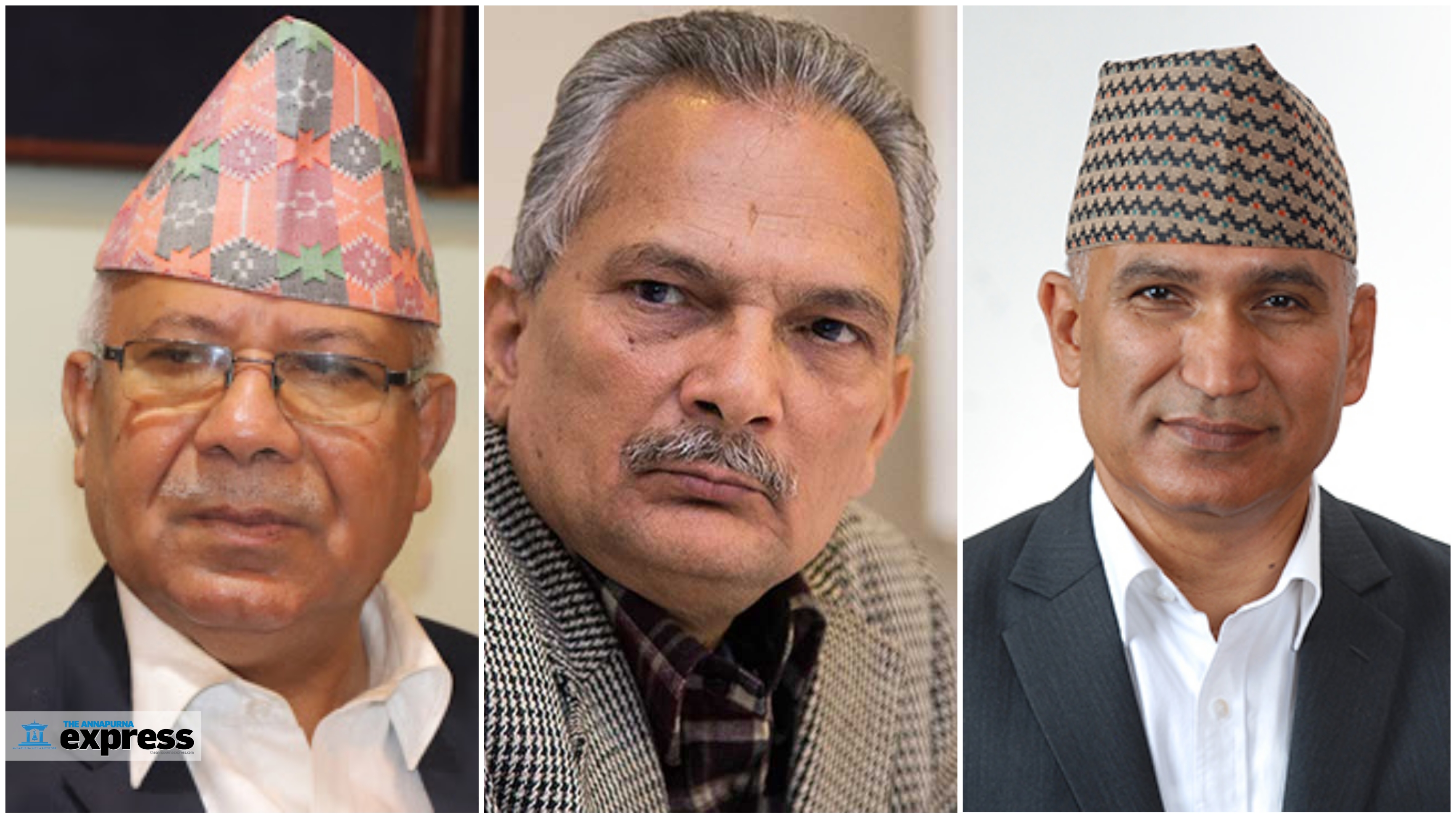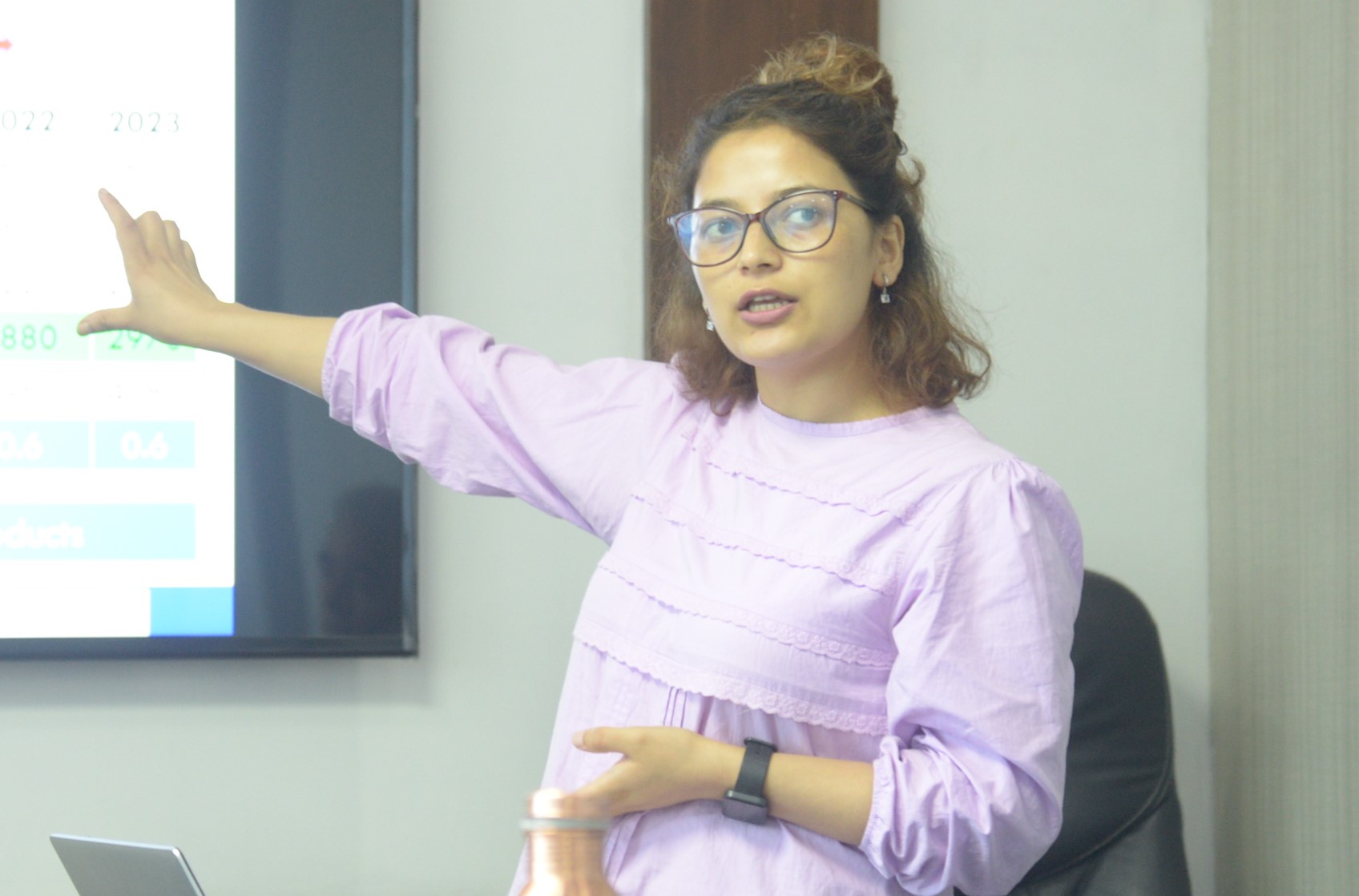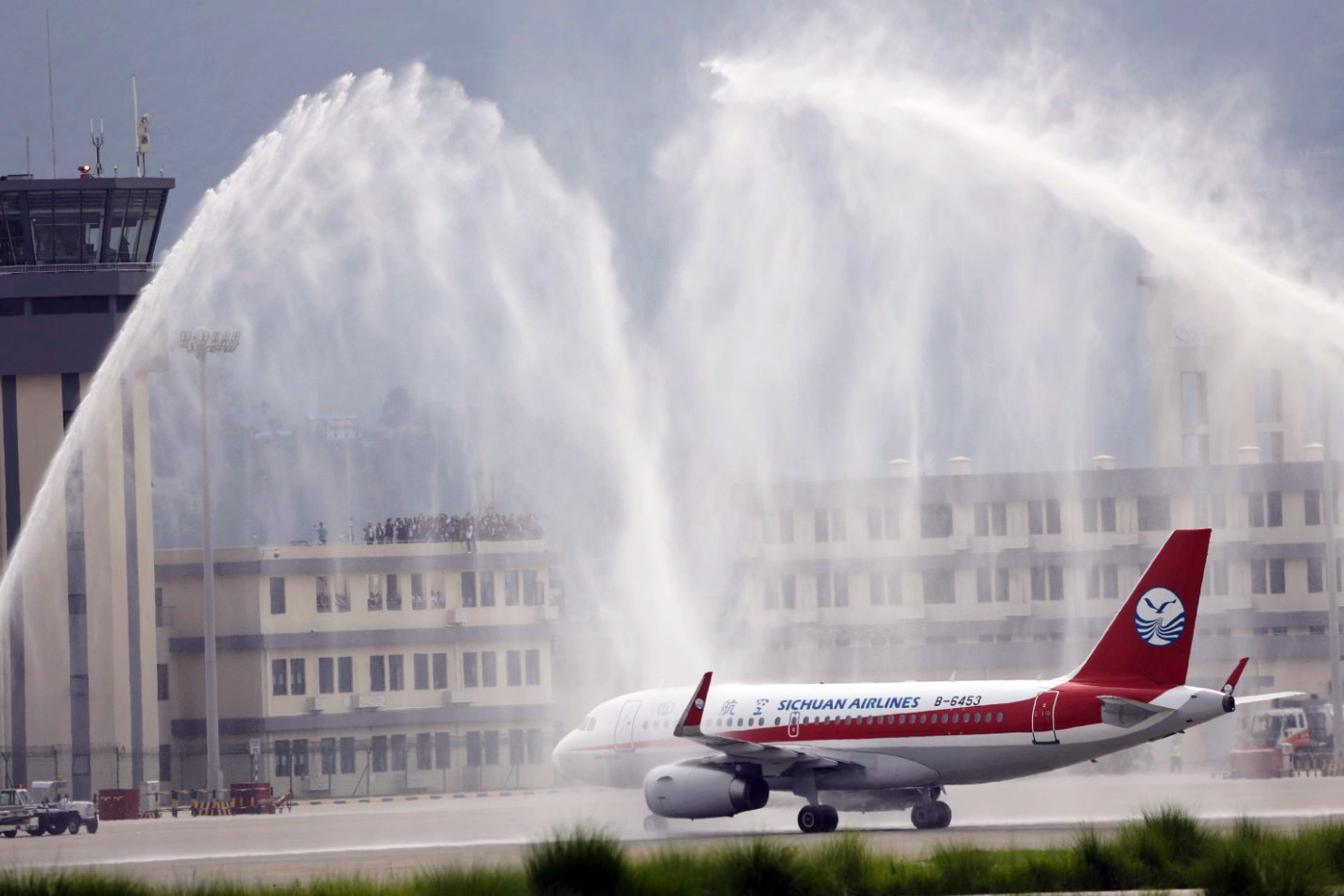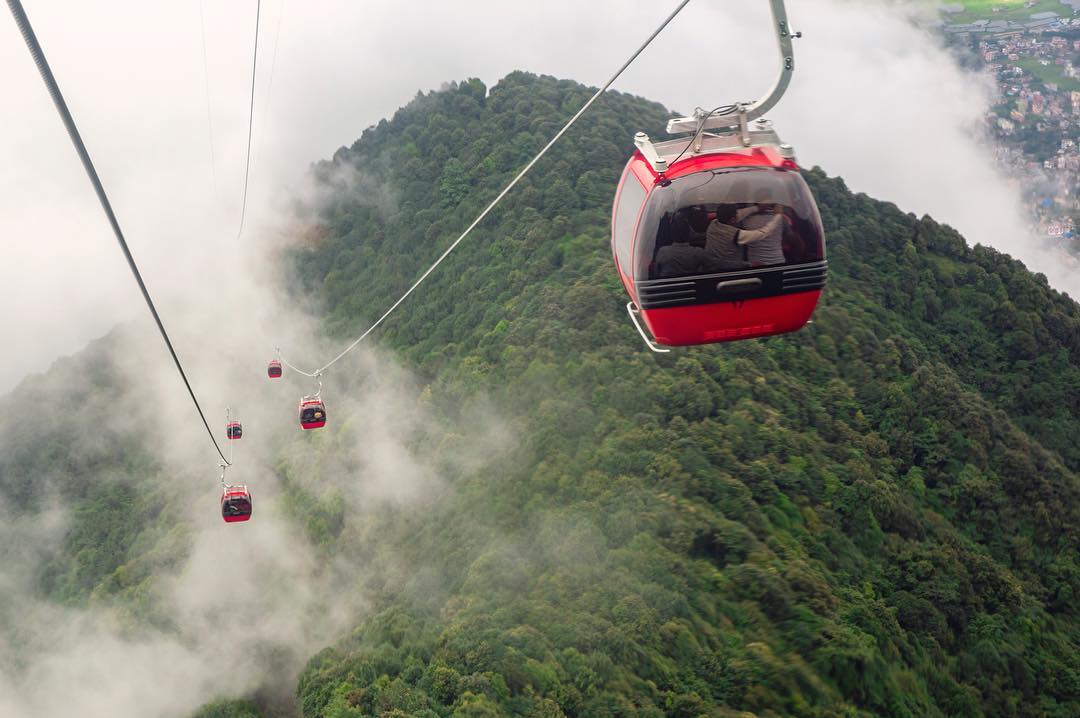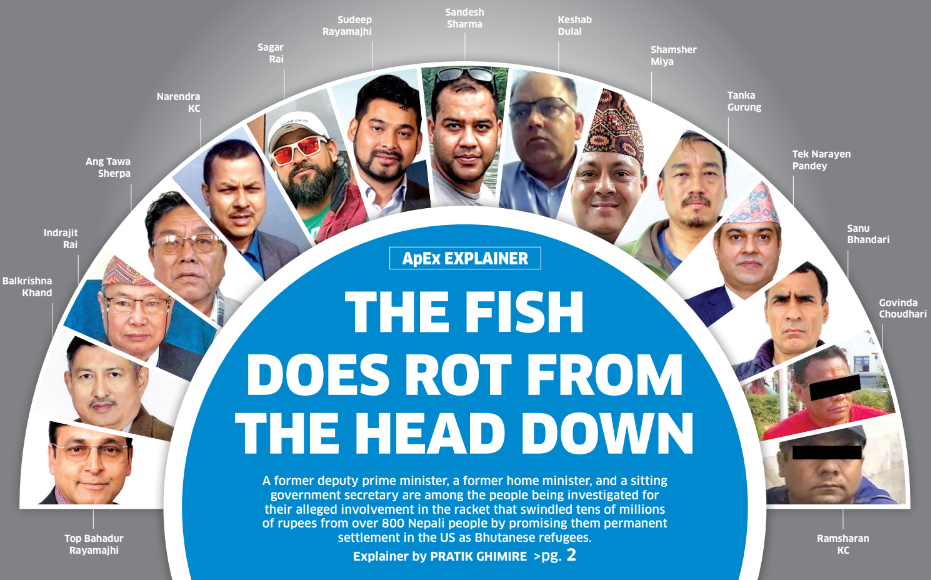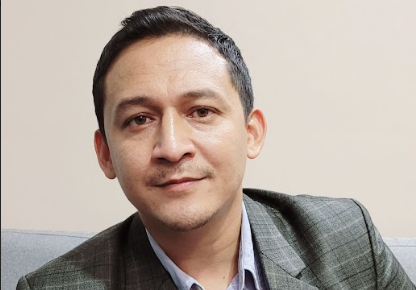Lalita Niwas scam: All eyes on ‘high-profile’
As the Central Investigation Bureau (CIB) of Nepal Police reopens the files of Lalita Niwas land grab scam, all eyes are on ‘high profile’ political leaders who were allegedly involved in the case. As CIB continues to arrest more individuals for the investigation, some high-profile leaders have already left Kathmandu and it has caused unease among the politicians whose names were drawn in one of worst corruption scandals of past decades.
For instance, the CIB investigation forced former prime minister Baburam Bhattarai to come up with a long clarification claiming that he is not involved in the case. Other senior leaders are former prime minister Madhav Kumar Nepal, former Minister of Land Reform and Management Dambar Shrestha, CPN-UML Vice-chairperson Bishnu Paudel, and Supreme Court sitting Justice Kumar Regmi. The Commission for the Investigation of Abuse of Authority (CIAA) has already confirmed that the transfer of government land to individuals began during the tenures of Nepal and Bhattarai. Shrestha served as the land reform minister during Nepal’s premiership, and later, Paudel’s son Nabin Paudel bought land in the Lalita Niwas premises.
Even SC Justice Regmi purchased land there. The CIAA’s charge-sheet stated that the decisions made by Nepal and Bhattarai’s cabinets regarding the Lalita Niwas land case were collective policy decisions beyond their jurisdiction. According to the CIAA, Paudel and Regmi are not under its radar as they have pledged to return the land. However, the Nepal Police Spokesperson, Deputy Inspector General (DIG) Kuber Kadayat, mentioned that the CIB is investigating the case for forged documents and fake governmental stamps, not solely relying on the CIAA’s corruption investigation. “We, hence, don’t rely on CIAA’s investigation and nab everyone who is involved,” he says.
The CIB has already apprehended ten individuals, including Min Bahadur Gurung, the owner of Bhatbhateni Supermarket, and Sudhir Kumar Shah, a former election commissioner, in relation to the Lalita Niwas land grab case. The other individuals arrested were Kaladhar Deuja, Hupendramani KC, Surendra Kapali, Dharma Prasad Gautam, and Gopal Karki. Deuja, KC, and Kapali were released shortly after their arrest following a Supreme Court interim order that instructed authorities to investigate the individuals without holding them in custody. As of now, the CIB has nine individuals in their custody in connection with the Lalita Niwas scam. However, these seven individuals are not the only ones accused in this case.
The CIB has a list of over 400 suspected individuals. There are concerns that individuals should not evade punishment simply by returning unlawfully acquired property. The public has also expressed concerns about avoiding politicization of the case and ensuring a thorough investigation leading to punishment for the culprits.
Sharada Prasad Trital, the coordinator of the committee formed to study the Lalita Niwas land grab case, stated that the government land was systematically divided and distributed among individuals as if it were a gift. “The CIB has uncovered substantial evidence indicating potential involvement of individuals associated with political parties and their leaders, raising concerns about potential pressure on the police and the court to influence the investigation,” he says. Trital emphasized the need for impartiality and a conclusive outcome in the investigation, asserting that immunity should not be granted based on political affiliations. Both former prime ministers Nepal and Bhattarai have publicly proclaimed their innocence in this case.
Bhattarai took to Twitter to assert his innocence and stated that his cabinet made decisions following legal and ethical procedures, including on the Lalita Niwas land issue. Nepal has also been defending himself, claiming the allegations against him are false and has even said that he is ready to face punishment if found guilty. Former Nepal Police DIG
Hemanta Malla Thakuri says that no matter how much the police try to nab the so-called big fishes, without the support of the government, it is going to be difficult. “Nepal Police is just a small unit of a large system of Nepal which is driven by politics, bad politics actually,” he says. “All the political parties and media should pressurize the government for a better probe.”
Under the provisions of the Organized Crime Act, individuals found guilty of organized crime may face imprisonment of up to five years or a fine of up to Rs 500,000. Since the Lalita Niwas land grab case involves interconnected criminal activities, the police believe it falls under the purview of the Organized Crime Act. The severity of the punishment will depend on the level of involvement of each implicated individual. In cases of organized crime, the police have the authority to detain the accused for a maximum of 60 days to gather evidence, whereas the maximum detention period for other offenses is 25 days. Through collusion among leaders, high-ranking officials, and the land mafia, 143 plots of government land in Lalita Niwas were fraudulently registered in the names of individuals.
Anjana Lamichhane: Increased tax is need of the hour
The tax on cigarettes in Nepal is the lowest in South Asia. At a time when the government is putting a 13 percent value-added tax (VAT) on daily essentials like potatoes and onions, it did not increase the tax on cigarettes significantly in the budget for the fiscal year 2023/24. Compared to most countries in the world, taxes on tobacco and cigarettes are very low in Nepal. The government only increased the tax on cigarettes by three percent. In this context, Pratik Ghimire of ApEx talked to Anjana Lamichhane, research associate at Nepal Development Research Institute (NDRI).
Despite the continuous lobbying, the government didn’t impose high tax on tobacco products. Why do you think so?
The current tax rates imposed on tobacco products in Nepal remains considerably low compared to neighboring countries and international recommendations. In the previous two years, the government had raised around 50 percent (25 percent in 2021/22 and 20 percent in 2022/23) excise duty and 20 percent increase in health hazard tax. But this year, the government has increased excise duty on tobacco products by a paltry 3 percent, bringing the total tobacco tax to 41 percent. However, it is lowest in South Asia as India and Sri Lanka impose significantly higher taxes, accounting for 53 percent and 77 percent of the retail prices, respectively.
The World Health Organization (WHO) recommends a minimum taxation of 75 percent to effectively discourage tobacco consumption. There has been no increase in the Health Hazard Tax this year. When accounting for the estimated inflation for the upcoming fiscal year, the overall percent of tax will decline to 39 percent from the 41 percent, further hampering the recommendations and needs. Despite our heightened lobbying efforts this year—surpassing the efforts made in the past five years—the government has failed to significantly increase the tax. It is difficult to ascertain the exact reason behind this unexpected turn, as the government had assured us to impose higher taxes on tobacco. The government’s decision has caught us off guard and left us puzzled.
Do you see a nexus between the government and tobacco-related businesses in this matter?
I can’t say because I have no proof. Despite our efforts, the government is reluctant to impose a higher tax rate on tobacco-related products, which means the government may have come under pressure from some quarters. These things should be researched and truth must be uncovered as the high prevalence of tobacco use, coupled with the associated health risks and economic costs, demands urgent action.
Is an increase in tax the only way out to reduce tobacco consumption?
The WHO came up with the ‘MPOWER’ formula in 2008. It is a comprehensive plan comprising six essential and effective strategies for tobacco control. These strategies are: M (Monitoring tobacco use and prevention policies), P (Protecting individuals from tobacco smoke), O (Offering assistance to quit smoking), W (Warning about the hazards of tobacco), E (Enforcing bans on tobacco advertising, promotion, and sponsorship) and R (Raising taxes on tobacco). Among these, taxation plays a key role in effective tobacco control. It will take a couple of years for visible results to emerge. Tobacco is consumed by people of any background in Nepal and if the tax is increased, not everyone can afford it easily. Increasing tobacco tax rates can have other positive effects as well. For example, it can generate substantial revenues for the government, which can be utilized to fund various development projects, improve public services, and health care, among others.
How will this impact us?
Tobacco use poses a significant public health problem with far-reaching consequences. The affordability of tobacco products has contributed to a persistently high prevalence rate (of around 32 percent) among the population. This has led to increased mortality and morbidity from non-communicable diseases in Nepal, with an estimated 37,529 tobacco-attributable death in 2019 alone. Notably, tobacco use accounts for two out of every 10 deaths (19.4 percent) and stands as the second leading cause of death in Nepal. Also, tobacco use entails substantial economic costs, estimated at around Rs 40bn in 2022.
What are your recommendations for the budget of fiscal year 2023/24?
The Ministry of Finance must increase the excise duty on tobacco by at least 40 percent by amending the budget for the fiscal year 2023/24. A 40 percent hike in excise duty can generate an additional Rs 8.7bn to Rs 10.7bn in revenue, equivalent to approximately 2.3 percent of the forecasted budget deficit for 2023/24. Such an increase can lead to a consumption reduction of 2-6 percent. Alternatively, a more ambitious target of a 65 percent increase in excise duty will generate revenue of Rs 13.1bn to Rs 16.8bn. It is equivalent to over 3.7 percent of the forecasted budget deficit for the fiscal 2023/24. This move can reduce tobacco consumption by about four to 12 percent. These measures will significantly reduce damage resulting from tobacco use—both to public health and the national economy.
Government mum on China’s BRI claims
Once again, China has claimed that Pokhara International Airport (PIA) is a project under its Belt and Road Initiative (BRI), raising eyebrows in Kathmandu. Despite Nepali leaders’ repeated assertion that this is not a BRI project, China continues to put it under the BRI which is likely to cause diplomatic friction between the two countries. However, the Ministry of Foreign Affairs remains mum about China’s latest claim. The ministry has not sent any diplomatic notes to China, seeking a clarification.
Under the BRI, Nepal has proposed nine projects but there has not been any progress on it. At the same time, the BRI implementation plan is yet to be finalized. In this scenario, experts say, it is not appropriate to list all projects built under Chinese loan or grant under the BRI framework. China’s claim clearly shows its desperation to push the BRI project in Nepal, says Vijay Kant Karna, foreign policy expert.
Amid a program held after the first international plane landing at the PIA on Wednesday, Chinese Ambassador to Nepal Chen Song claimed that the airport is under the BRI project. He said that the airport was designed and built by a Chinese company which was made under the BRI project. While Nepal signed the BRI project in 2017, the contract for the airport project was signed in 2014. Luo Yan, chairman of the China CAMC Engineering Co Ltd, and Ratish Chandra Lal Suman, then director general of Civil Aviation Authority of Nepal, had signed the contract worth $215.96m.
On 21 March 2016, China Exim Bank and the Government of Nepal signed a government concessional loan (GCL) agreement worth RMB 1.37bn for the Pokhara International Regional Airport Construction Project. Twenty-five percent of the loan value (RMB 355.9m) was provided without interest and with a maturity period of 20 years and a grace period of seven years. The remaining 75 percent of the loan value (RMB 1.02bn) was provided at a two percent interest rate, 20-year maturity period and a seven-year grace period.
While inaugurating the airport on 1 Jan 2023 too, the Chinese embassy had claimed it as a part of the BRI project. Karna says that this is a result of poor diplomacy of Nepal. “China is facing a dilemma because it couldn’t manage the BRI projects in Nepal,” he says. “China has now started claiming random projects as BRI out of desperation.” After four attempts to contact Foreign Ministry spokesperson Sewa Lamsal for comments failed, ApEx called up assistant spokesperson, Paras Pandit, who suggested contacting spokesperson Lamsal once again. The fifth call yielded no different result.
What next for public vehicle electrification?
Electric vehicles (EVs) accounted for only one percent of the total vehicle fleet in Nepal in 2020. However, their popularity is increasing, presenting a significant opportunity for the private sector to invest and create a favorable environment for EVs. This entails establishing an adequate number of charging stations, implementing vehicle standards, and crucially, ensuring accessible financing systems.
According to data, the import of electric vehicles during the first 10 months of the current financial year amounted to Rs 8.41bn, resulting in customs revenue of Rs 2bn for the government. In contrast, the annual import cost for petroleum-powered vehicles is reported to be Rs 100bn. While the use of electric vehicles is gaining momentum, their integration in public transportation remains low in Nepal.
“Anyone who has tried public transport in Nepal knows it can be difficult, that’s why many people in the country use private vehicles. That creates its own issues like traffic congestion, accidents and not to mention more use of fossil fuels to power vehicles,” says Martin Holtmann, IFC Country Manager for Nepal, Bangladesh and Bhutan. “The problem has worsened over the years, with vehicle emissions being one of the three main sources of air pollution in Kathmandu Valley.” The transport sector is also the largest contributor to Nepal’s greenhouse gas emissions. So, it’s time to think of electric mass transit as a means of helping people get around cities in a way that’s better for the environment. “Nepal has the advantage of hydropower—a renewable energy source to meet its energy needs and what better way to use that natural resource than to power mass transit?” adds Holtmann.
Various companies, including TheeGo, Mahindra, BYD, Kia, MG, Hyundai, Tata, and Nissan, are selling electric vehicles in Nepal. However, to reduce imports and enhance self-sufficiency, it is crucial to establish domestic production of electric vehicles. Electrification of commercial vehicles is the need of the hour, says Rajan Rayamajhi, MD of TheeGo. “A 11-seater commercial vehicle runs around 300 kilometers daily and consumes around 40 liters of diesel. It could easily be displaced by an EV,” he says the commercial EVs give a larger profit margin to the bus owners.
“The private sector is doing well to support electrification drives but the government policy, banks and lawmakers only see private passenger vehicles as EV.” Mulkot, where TheeGo has installed charging stations, became the second largest electricity consumption of Sindhuli district. “Due to the lack of stability in our policies and plans, commercial EVs are ignored,” Rayamajhi adds.
The recent budget has imposed tighter customs duties on electric vehicles compared to the previous year. The exemption on excise duty for vehicles up to 100 kW provided in the previous budget has been reduced to vehicles up to 50 kW. Additionally, a 15 percent customs duty and a 10 percent excise duty have been levied on vehicles ranging from 50 kW to 100 kW. These changes resulted in a surge of electric vehicle imports up to 100 kW in the past year. Contrary to expectations of a more lenient import policy for electric vehicles, the government has increased tax rates despite encouraging their use.
Compared to the previous year, customs duties have been reduced by 10 percent and excise duties by 20 percent for vehicles between 100 kW and 200 kW. Customs duties for vehicles between 200 kW and 300 kW have been lowered by five percent to 40 percent, while excise duties remain at 45 percent of the previous year’s rate. Vehicles above 300 kW still face a tax rate of 60 percent.
Furthermore, the current budget has eliminated the tax exemption previously granted to the local vehicle manufacturing industry for importing parts. This move has raised concerns among experts, as it may discourage the establishment of new industries. Although domestic electricity production is increasing, there is wastage during the rainy season due to limited consumption capacity. With a commitment to achieving zero carbon emissions by 2045, the government asserts that all vehicles, whether imported or domestically produced, will eventually be electric.
Rather than increasing import taxes, the government should focus on creating a supportive environment for domestic electric vehicle production, says expert. “Commercial EVs drive has just started in Nepal but the recent increase on custom duty has disappointed the consumers and private stakeholders,” adds Rayamajhi of TheeGo.
The Nepal Electricity Authority (NEA) predicts a rise in electricity consumption during the winter season in the coming years, in addition to the current increase during the rainy season. Increased consumption is influenced not only by household electricity usage but also factors such as the growth of factories and the adoption of electric vehicles. Consequently, the government should prioritize efforts to boost the production and usage of electric vehicles. By expanding the production of EVs and encouraging domestic consumption, the import of petroleum products can be reduced. This, in turn, would contribute to decreasing the trade deficit with India, potentially saving over Rs 200bn annually in reduced petroleum imports.
Establishing an electric vehicle plant leads to technology transfer, bringing the latest high-level technology to Nepal. Introducing new practices in the industrial sector also raises awareness about the importance of technology in other industries. “The initial focus for electrification could be on two- and three-wheelers as they make up 80 percent of Nepal’s vehicle traffic. Then the focus can be shifted to public buses,” suggests Holtmann. “The move to a greener urban transport will require coordination between the public and private sectors, and between the federal and local government levels. This may need some effort, but it is a plan worth considering to help Nepal cut off its reliance on fossil fuels… and deliver a resilient and sustainable future.”
Currently, TheeGo primarily operates public electric vehicles. Sajha Yatayat has imported 40 electric buses from China but has faced challenges in providing services with only six of them. The lack of charging stations and other infrastructure limitations in the valley have forced these buses, purchased for approximately Rs 560m, to remain idle in parking spaces in Banepa, Lalitpur, and Pokhara.
Recently, electric microbuses and vans have been introduced for long-distance public transport, mainly operating on the BP Highway. However, government cooperation and support in this regard seem unpromising. Sundar Yatayat, which previously operated around a dozen public electric buses within and outside Kathmandu Valley, halted its electric bus service in Feb 2023 due to a lack of government cooperation. The company cited the government’s failure to implement the NEA’s decision to waive demand fees for EV charging stations as the reason for its decision to discontinue electric bus services.
Global electric bus scenario
Since 2020, there has been a notable rise in the popularity of electric buses. Global sales of electric buses reached approximately 66,000 units in 2022. The dominant force in this market is China, accounting for over 80 percent of all electric bus sales worldwide. Moreover, China stands out for its prowess in electric bus manufacturing and serves as a significant exporter to Latin American, North American, and European nations.
Within the European Union, the Clean Vehicles Directive sets targets for the adoption of electric buses in public procurement. Several EU countries, including France, Germany, and Spain, have witnessed a surge in electric bus sales. Finland, in particular, achieved the highest sales share of electric buses in Europe in 2022, with electric buses accounting for over 65 percent of total sales.
By 2030, according to the Stated Policies Scenario (STEPS), the global number of electric vehicles (excluding two/three-wheelers) is expected to reach around 240m, constituting more than 10 percent of the total global vehicle fleet. In a more ambitious scenario known as the Announced Pledges Scenario (APS), it is projected that nearly 250m electric vehicles will be in operation globally by 2030. Moreover, electric vehicle sales are anticipated to represent over 35 percent of all vehicle sales during that period.
The Net Zero Emissions by 2050 Scenario (NZE), which aims for a more aggressive transition to electric vehicles, predicts that the global electric vehicle stock will reach 380m by 2030. Furthermore, electric vehicle sales are expected to account for 60 percent of all vehicle sales during that time frame. These scenarios by the International Energy Agency (IEA) outline varying degrees of electric vehicle adoption and provide different outlooks for the future, depending on the level of policy implementation and commitment to achieving net-zero emissions.
Prospects of ropeways in Nepal
“Ropeways can be a vital means of goods-transport in a country like Nepal with its rugged terrains and ever-present risks of roads being blocked by water-induced disasters,” says Victoria Hilda Rigby Delmon, Manager, INR Asia Upstream and Advisory-IFC. “Compared to air and road transport, ropeway transport is cheaper too.”
The importance of ropeways for Nepal had become evident even a century ago: construction on the country’s first ropeway, the 22-km link between Makawanpur and Kathmandu, had started in 1922 under the orders of Prime Minister Chandra Shamsher. In the latter half of the 20th century, the country had many more ropeway lines. In 1986, Hetauda Cement Factory started one to ferry limestones.
In 1995, the Conservation Ropeway was built at Bhattedanda on the outskirts of Kathmandu valley to transport milk. There were a few other lines as well. But they soon fell into disuse as the national focus shifted to roadbuilding, despite clear evidence of the cost-effectiveness of the ropeways. Now the discourse on the revival of ropeways in Nepal has again started. Seven ropeways for human transport and almost a dozen gravity goods ropeways are in operation in Nepal.
Reports suggest that the country could have ropeways in nearly 2,000 areas and feasibility studies have been conducted in 62 places. But to install a ropeway for people transport in Nepal, an investor has to get approval from 21 different government authorities. “We’ll not attract investors unless our bureaucratic hurdles are simplified,” says Guna Raj Dhakal, chairperson of Ropeway Nepal Pvt Ltd. Installing ropeways is six times cheaper than building roads and the maintenance cost is also low.
The 42-km Hetauda-Kathmandu Ropeway, for instance, cost half as much as the Tribhuvan Highway on the same route to build. “Yet the government is still skeptical about ropeways,” adds Dhakal. “We don’t even have a dedicated ropeway department or policies for that matter.” IME Group, which built Chandragiri Cable Car under Chandragiri Hills Pvt Ltd, is currently working on additional cable car services. These include Butwal Bazar-Basantapur (3 km), Chisapani Highway-Rajkada (Kailali), Sikles-Kori (Kaski) and Ghantikhola-Swargadwari Temple in Pyuthan district.
Works are also afoot to start a cable car service in Pathivara Temple in Taplejung. Besides, private companies are conducting ropeway transport feasibility studies in Dakshinkali-Chaukhatdevi, Budhanilkantha-Shivapuri Hill and Bohoratar-Nagarjun Hill in Kathmandu; Godawari-Phulchowki Hill in Lalitpur; Ghorahi-Swargadwari Temple in Pyuthan; Ghyangphedi-Gosainkunda in Rasuwa; Lukla-Namche Bazar in Solukhumbu; Devghat-Moulakalika Temple in Chitwan; and Ranital-Maulakalika in Nawalparasi.
Nepal Investment Board is also facilitating the study for an 84-km cable car service from Birethanti-Kagbeni-Ranipauwa to Muktinath Temple in Mustang. If implemented, the project is expected to significantly boost tourism and improve the livelihood of local people. “Ropeways have the potential to alter the economy of Nepal as it can boost tourism, improving income-generation and employment opportunities,” says Delmon. “As Nepal has huge potential in hydropower, ropeways are highly feasible here.” “During the monsoon season, the rural road network which is around 4,500 km across the country gets impacted by the heavy rain, flood and landslides resulting in connectivity loss to the district headquarters for around one-fifth of the total population,” she adds.
Year 2022 marked the centenary of the start of the ropeway in Nepal. Renewable Energy Confederation of Nepal (RECON), Nepal Ropeway Association, and other relevant institutions had celebrated the 100 years by holding seminars on the importance, relevancy, and revival of ropeway technology in Nepal. They hoped these events would push the government authorities to rethink the revival of ropeway transport in Nepal, but to no avail.
The book ‘Ropeways in Nepal’ by Dipak Gyawali, Ajaya Dixit, and Madhukar Upadhya recounts many past success stories of Nepali ropeway projects, but the idea of developing ropeways to ease the problem of transporting goods and humans has simply not registered on the minds of the government officials and ministers. “The fact is the government officials and ministers do not get much commission from ropeway development unlike road projects,” says Gyawali, who is also a former water resource minister.
After the success of pioneering ropeway projects, the government incorporated plans and policies for improving and extending the existing ropeway services in the fifth Five-Year Plan. With grant assistance from the US government, the old 22-km long, low-capacity mono-cable system between Dhorsing and Kathmandu was replaced and extended with a 42-km-long bi-cable ropeway between Hetauda and Kathmandu.
The sixth Five-Year Plan proposed developing gravity ropeways in the hills and mountains to transport daily goods and Rs 6m was allocated to execute the plan, but nothing came of it. After the restoration of multi-party democracy in the 90s, the eighth Five-Year Plan incorporated ropeways under the sub-sector of ‘other modes of transport’ and announced a program for consolidating the existing ropeways and operating them at full capacity.
There was also the plan of encouraging the private sector for the development of short-haul ropeways to promote tourism as well as developing gravity ropeways. For these purposes, the government of the time allocated Rs 158m. The next national plan announced a more ambitious 20-year National Transport Master Plan that included a cable car/ropeway development program and privatization of ropeway transports so that they could be operated more effectively.
The approach paper of the 10th Five-Year Plan (2002-2007) again stated that policies for developing ropeway transportation would be adopted. It also set the aim of encouraging private entrepreneurs to construct and operate cable car/ropeways in places with importance for tourists and local economies where road access is lacking. Priority for cable car/ropeway development would be accorded to those areas where the cost of constructing and operating roads would be comparatively high.
Experts say though policies and modest-scale programs were incorporated in Nepal’s Five-Year Plans, the progress over the years have been slow. In fact, they add, the ropeway development plan has more or less remained stagnant since 2007. Its potential to become an important segment of the country’s transport system was not realized. Operation and maintenance head of Manakamana Cable Car, Nepal’s first human transport ropeway, Sunil Karmacharya says that Nepali market, these days, is more attracted to human transport ropeways than material transport. The Manakamana Cable Car has been in operation for 25 years now.
“Back then, there used to be around 500,000 passengers per year which now has around 1.1m passengers. However, I see lesser chances in mass carrying ropeways in Nepal,” he says these cable cars, if operated properly can be enough for mobility and transport.
Scenario of energy trade
Nepal and Bangladesh have entered an agreement to strengthen their energy trade cooperation. During the fifth meeting of the secretary-level Joint Steering Committee (JSC) on energy cooperation held in Dhaka, both governments agreed to jointly develop the Sunkoshi-III Hydropower Project. This storage-type hydropower plant, with a capacity of 683 MW, aims to supply electricity to Bangladesh.
The JSC meeting also agreed to work on a tripartite agreement with India to facilitate the export of 40 MW of electricity from Nepal to Bangladesh. It’s been a year since talks for electricity exports from Nepal to Bangladesh gained momentum. Nepal’s quest for finding a market for its electricity beyond India was further emboldened after Bangladesh expressed readiness to import 40-50 MW of power from Nepal during the energy secretary-level JSC meeting of the two countries held in Kathmandu in the last week of August last year.
Nepal and Bangladesh had also agreed to request India for the passage of 40-50 MW of electricity from Nepal to Bangladesh through the existing transmission infrastructure of India. Both sides have been making efforts to bring India on board for this purpose. Bangladesh’s state Minister for Power, Energy, and Mineral Resources Nasrul Hamid had also sought “visible Indian cooperation” for importing hydropower from Nepal.
According to The Daily Star, Hamid talked about the growth of Bangladesh’s power sector and said the demand for electricity is increasing continuously in the country. In response, the Indian side assured to cooperate to operationalize Nepal-Bangladesh energy trade, The Daily Star reported in Jan 2023. Bangladesh is eager to buy electricity from Nepal—their engagements say so. Nepal Electricity Authority (NEA) Managing Director Kulman Ghising also confirmed it recently.
At the Memorandum of Understanding (MoU) signing event between the NEA and Employees Provident Fund (EPF) for investing in Tamakoshi-V Hydropower Project, Ghising said the market for power export is getting assured. “India and Bangladesh are eager to purchase power from Nepal,” he added. In an interview with ApEx in Jan 2023, Ambassador of Bangladesh to Nepal, Salahuddin Noman Chowdhury had said that energy cooperation is a very prospective area between two countries. He said: “Bangladesh is energy hungry while Nepal will soon become energy surplus. That is a perfect scenario for complementing each other’s needs.”
Nepal’s ambitious goal of producing 6.8 GW of hydropower by 2030 seems achievable, with numerous hydropower projects currently operational or in the pipeline. However, the current domestic peak demand falls significantly short of this capacity, with the NEA reporting a current peak demand of 1,700 MW.
In the Power Summit 2023 held last month, Prime Minister Pushpa Kamal Dahal said that the government expects Nepal to become a net power exporter by 2025. Efforts are underway to strengthen transmission lines and other infrastructure connecting Nepal, India, and Bangladesh to support the realization of surplus energy trade objectives.
“Nepal can not only achieve its ambitious net zero emissions by 2045 but can also help neighboring nations meet their climate goal by exporting surplus energy,” says Jason Pellmar, New Business Manager for Infrastructure Investment, South Asia, IFC. However, Dipak Gyawali, former minister of water resources, doesn’t see profit in energy trade. “It’s a waste of time to focus on exporting energy to Bangladesh”, he says. “India won’t let Nepal export electricity to Bangladesh.” Even if India allows, they will ask us to export it to India and they will export it to Bangladesh from their national grid, which is not profitable at all, Gyawali adds. “India will try to create monopoly.”
The prospect of Nepal exporting 50 MW of electricity to Bangladesh through the Indian transmission link may not happen soon. The Indian side in Jan 2023 told Nepali officials that electricity export from Nepal to Bangladesh through the Baharampur-Bheramara cross-border power transmission line is not immediately possible.
However, it is expected that Prime Minister Dahal’s visit to India may give some breakthrough. Government officials involved in the preparation of the visit said that energy sector cooperation between the two countries will be on the list of agendas for the prime minister to take up with the Indian side.
Private sector’s involvement
“Private sector should have a role in the energy trade too,” says Pellmar. “International Finance Corporation (IFC) sees tremendous space for private collaboration in regional energy trade and looks forward to continuously working with the private sector building on correct momentum to help Nepal meet its climate goals.” He further adds that the private sector should be encouraged by policy makers by framing regulations to open the market. The government is planning to amend the Hydropower Development Policy, 2001.
The two-decade-old policy is being revised in order to incorporate the latest developments and changes in the energy sector as Nepal gradually moves toward becoming a net energy exporter from a net energy importer. During a discussion to prepare a framework of the amendment, stakeholders stressed the need to make the policy private-sector friendly.
“The investment of the private sector in hydropower has increased lately. But the government’s policy is not private sector friendly,” said Ganesh Karki, vice-president of Independent Power Producers’ Association, Nepal (IPPAN). “Currently, the private sector contributes 80 percent to the electricity production. Still, the private sector is ignored.” The private sector representatives also mentioned the need to allow the private sector to engage in power trading.
“The participation of the private sector in electricity production has brought Nepal to this stage. Within a few years, Nepal’s installed capacity will reach 8,000 MW. However, all the electricity generated will not be consumed in Nepal. It needs to be sold to India and Bangladesh, for which government initiative alone is not enough,” Karki said. “Now, we need the participation of the private sector to take a leap in the power trading business.”
The Power Summit 2023, held recently, witnessed the signing of deals between Nepali and Indian power entities. Manikaran Power Limited agreed to purchase approximately 200 MW of electricity directly from hydropower projects in Nepal, while Vedanta India initiated the process of signing a long-term power purchase agreement (PPA) with Nepal Power Exchange Limited for the purchase of 2,000 MW of electricity.
With Indian companies showing increasing interest in buying energy from Nepal, local power developers emphasize the need for laws facilitating private sector involvement in power trading. According to the Ministry of Energy, Water Resources and Irrigation (MoEWRI), around half a dozen companies have already applied for power trading licenses and have signed contracts with Indian companies for electricity selling, though there are no laws for such licenses. The southern neighbor so far has allowed Nepal to sell power in the day-ahead market—the type of market where the price of electricity is fixed a day before the trading of power. Nepal sold electricity worth over Rs 11bn in the last wet season (June-Nov 2022) in the Indian day-ahead market. But this number would have been increased if Nepal had the opportunity to sell its electricity in all kinds of Indian power markets.
The stakeholders in the Power Summit also asked for more flexible guidelines on providing market access to Nepal’s power to the Indian market. Currently, India provides market access on a project-to-project basis and the export of electricity has to go through several approval processes with the Indian authorities. Nepali officials say that a long-term inter-government agreement would help end the existing red tape in the approval process. Power generation capacity in the country has now reached 2,650 MW and it is expected to increase to 2,853 MW by mid-July this year, according to NEA.
According to Ashish Garg, vice-president of IPPAN, the Power Summit 2023 reinforced the fact that there are buyers for the electricity produced in Nepal. “If we do not act urgently, over 1,000 MW of electricity will be wasted in the upcoming wet season.” Among the few challenges like internal issues of regulations and acts, geopolitical situations, infrastructure and techno-economic for the power trade, Kumar Pandey, executive chairperson of National Hydropower Company, says there is nothing vast to address but our stakeholders lack willingness.
ApEx Explainer: Understanding Bhutanese refugee scam
The fake Bhutanese refugee scam has rocked the country. Police have arrested 15 individuals so far, including a former deputy prime minister, a former home minister, and a sitting government secretary, for their alleged involvement in a racket that swindled tens of millions of rupees from hundreds of Nepali people by promising them resettlement in the US as Bhutanese refugees. The police plan to charge-sheet them under organized crime, while many are demanding that they be charged with treason. The racket was involved in forging the name list of Bhutanese refugees awaiting resettlement prepared by a task force formed by the Home Ministry.
Here is a simple guide to understanding the scandal that has disgraced Nepal’s government institutions, politicians and bureaucrats.
The beginning of Bhutanese refugee problem
The Bhutanese refugee crisis began in the early 1990s when tens of thousands of Nepali-speaking Bhutanese people (Lhotshampas) were driven away by the Bhutanese government from their homeland. Discriminatory policies and human rights violations targeting the Lhotshampas were the main cause of their displacement. Between 1990 and 1993, more than 100,000 Bhutanese refugees walked through India and entered Nepal in search of asylum.
According to government records, a total of 116,357 Bhutanese refugees were registered in Nepal. To accommodate the refugees, temporary camps were set up in Beldangi, Goldhap, Khudunabari, Timai of Jhapa, and Pahtari in Morang. According to the United Nations High Commissioner for Refugees (UNHCR), the number of refugees was 113,428 as per the count conducted in 2006. This number increased by 1,099 in 2008, 1,800 in 2012, and 30 between 2015 and 2018, bringing the total number of refugees to 116,357.
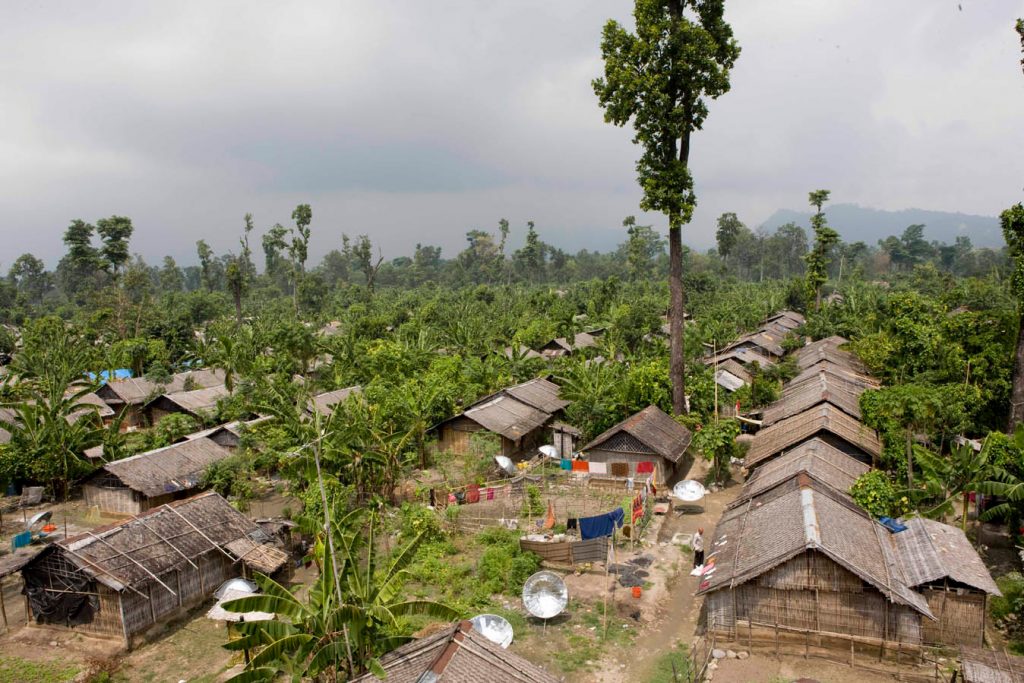 Overview of Bhutanese Refugee camp in Beldangi II camp | Photo: Bhutaneserefugee.com
Overview of Bhutanese Refugee camp in Beldangi II camp | Photo: Bhutaneserefugee.com
Failed repatriation talks
Soon after the Bhutanese refugee crisis, Nepal and Bhutan set up a foreign minister level talks team to repatriate Lhotshampas. But there was no breakthrough. After the 15th Miniterail Joint Committee meeting held in 2003, there has not been any talks between the two countries.
In 2007, the United States, along with several other countries, initiated the third-country resettlement program to provide permanent homes for the displaced Bhutanese residing in Nepal. As a result, tens of thousands of refugees were resettled in various countries, including the United States, Canada, Australia, New Zealand, and several European nations. Between 2006 and 2019, 113,307 refugees were resettled in these countries. According to the UNHCR record, 96,170 of them were resettled in the US, 7,070 in Australia, 6,839 in Canada, 1,096 in New Zealand, 875 in Denmark, 570 in Norway, 358 in the United Kingdom, and 329 in the Netherlands.
According to the UNHCR, 3,050 refugees are still in the camps. However, the government puts the number of refugees in camps at 6,577. Among them, 817 are not in camps and are not even coming to avail themselves of the facilities provided to refugees. In 2019, then foreign minister Pradeep Kumar Gyawali had initiated the talks to settle the remaining refugees but there was not any progress. Since the beginning, Bhutan has dismissed any possibility of taking back its citizens from Nepal.
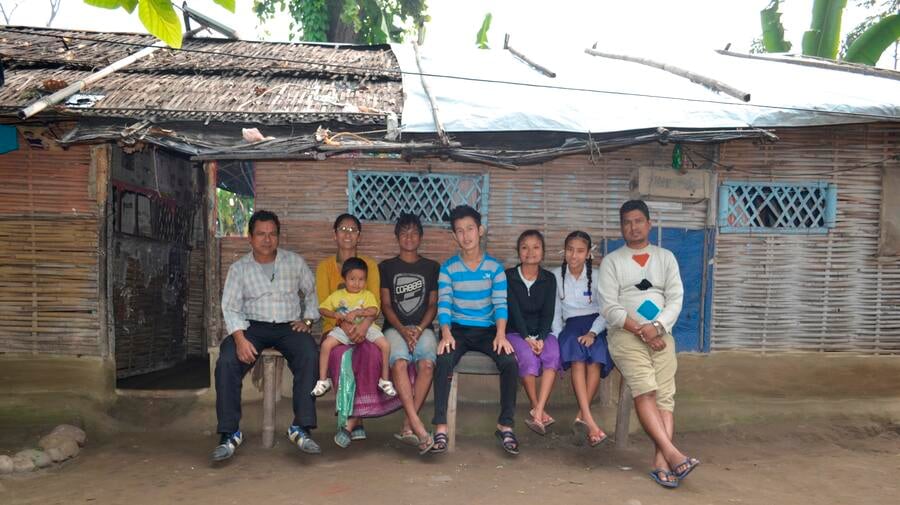 Bhutanese refugee Devi Maya Thapa (second left) sits on a bench with her family at a refugee camp in Nepal. She is the 100,000th Bhutanese refugee to be resettled | Photo: UNHCR
Bhutanese refugee Devi Maya Thapa (second left) sits on a bench with her family at a refugee camp in Nepal. She is the 100,000th Bhutanese refugee to be resettled | Photo: UNHCR
Management of remaining refugees
On 13 June 2019, the government of Nepal formed a task force under Joint Secretary Balkrishna Panthi to study whether the remaining refugees could be repatriated to Bhutan or resettled in foreign countries. One of the mandates of the task force was to collect applications from those refugees who were yet to be registered. The task force presented three suggestions for managing the remaining refugees in the camps: repatriation to Bhutan, resettlement in third countries, or integration in Nepal.
Although countries that previously welcomed Bhutanese refugees for resettlement and UN agencies are advocating for local integration, the task force states that it would not be an appropriate solution, given Nepal’s geopolitics and economic situation. The task force suggested that the government stop collecting applications for refugees, manage the refugees in the camps, dismantle the camps, and close the chapter on Bhutanese refugees for good. The UNHCR had already closed the third-country resettlement plan in 2016.
Both Nepal government and UN were mum on how to settle refugees who were denied to go for the third country.
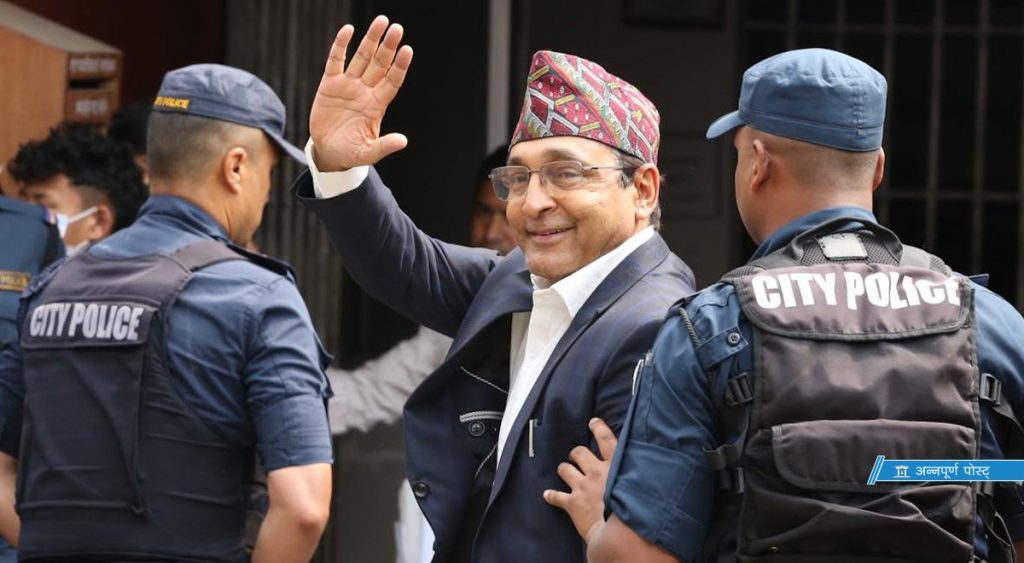
The scam
Police believe that Keshav Dulal, who served as a personal secretary to Nepali Congress leader Sujata Koirala for a long time and was aware of the resettlement process of Bhutanese refugees, was the mastermind behind the scam. Dulal took the help of one Sanu Bhandari to put the plan into action.
The duo managed to obtain the report of the Panthi-led task force, which the ministry had yet to make public, and allegedly added the names of hundreds of Nepali people to the list of refugees awaiting resettlement or registration. It is said they had collected Rs 1m to Rs5m from over 800 Nepali individuals who dreamt of settling in the US as Bhutanese refugees. The racket is also found to have collected biometrics from the people and issued them refugee identification cards. Police investigations have also revealed that the racket members used to drive around in Home Ministry’s vehicles to convince the people that the entire process was authorized by the government.
So far, Nepal Police has arrested 15 people in connection with the investigation. They include former Deputy Prime Minister and Member of the House of Representatives Top Bahadur Rayamajhi, former Home Minister Bal Krishna Khand, Secretary at the Office of the Vice-president Tek Narayan Pandey, former member of the House of Representatives Ang Tawa Sherpa, former Home Minister Ram Bahadur Thapa’s security advisor Indrajit Rai, Khand’s personal secretary Narendra KC, Keshav Dulal, Sanu Bhandari, Sagar Rai, Sandesh Sharma, Tanka Kumar Gurung, Sandeep Rayamajhi, Ram Sharan KC, Govinda Chaudhary, and Chairperson of Nepal Haj Committee Shamsher Miya.
Arrest warrants have also been issued against Pratik Thapa, son of former Home Minister Ram Bahadur Thapa, and Niraj Rai, son of Indrajit Rai. But both of them are reportedly on the run.
Pranaya SJB Rana: Commitment and qualification a must for politics
Besides being a politician, Pranaya SJB Rana is an academic as well as a practitioner of conflict resolution and peace. He served Nepali Army for seven years. He has around two decades of experience working in practical research and evaluation, organizational assessment and efficacy, social services, road safety, traffic management and public health backgrounds. He also holds a PhD in International Conflict Management from Kennesaw State University, Georgia, USA.
Pratik Ghimire of ApEx sat down with Rastriya Swatantra Party (RSP) leader Rana to talk about RSP’s political stances and his thoughts on youths and politics. Excerpts:
Why did RSP leave the government?
As soon as we won 20 seats in the lower house of the federal parliament, some people wanted us to be in opposition as they suggested that the existing parties have no good people and the RSP shouldn’t form a coalition with them. While some people wanted us in the government so that we could deliver. They were right too as they didn’t vote for us to be an opposition. As the people didn’t give a majority to any party, a coalition government was the only option. And having 20 seats, being the fourth largest party, it was our responsibility too to help form a government. We were emotionally guided to some extent. And in the by-polls, people have poured their love more strongly. They suggested we be in opposition and the party also thought that we can fight more effectively this way.
And hence we pulled out our participation and support from the government. It’s nothing like the recent rumors—that after the government opened the files of frauds and scams, RSP withdrew its support.
Where does the ideology of RSP lie? Center, right or left?
It’s not even been a year since the establishment of RSP. Our initial focus was to make RSP a delivery-based party. Soon, we went through a series of events: elections, government formation and by-polls, among others. We had no time to discuss such topics. But now, things have been settled down and we are already forming ad hoc committees in all provinces and local levels for a better party organization. With this, discussion and discourse have been started about our political ideology. We are actually in the process of shaping and sharpening our ideology.
Preparations have already started for our general convention. For building the party structure, we are moving ahead with a top-to-bottom approach, forming the ad hoc committees. After this, the convention will start with the bottom to top approach. There are advantages and disadvantages of leaning toward the right, left or remaining at the center. I personally prefer hybrids of right and left so that we can capture the very best from both. European countries have similar views which has helped them progress.
What’s your thought on provincial structure?
Again, there was a narrative that RSP is against federalism. But that’s not correct. We are not against provinces, but we are advocating for a better provincial structure. The current structure is so expensive, the state won’t be able to get with it for a long time. We, in the party, are discussing different provincial modalities. In my opinion, a province should have a directly-elected governor.
The governor should be accompanied with directly elected experts as commissioners, such as health commissioner, education commissioner and all. This will make our provinces as powerful and effective as local governments.
How’s RSP sustaining financially?
Many members of our party are working professionals. For instance, before this interview, I taught two classes in the morning. I am also a consultant. Because I am in politics, a full-time job is not feasible for me, hence I do freelance. This has helped me sustain my life and also helped me get involved in the party’s works.
Our party can’t provide us funds for campaigns, meetings and events. The party doesn’t invest in us, rather we invest in the party. We are in a mutually supportive system but most of the party workers and leaders are supporting themselves on their own. And the party aims to run its operation through funds collected from membership drives.
Does age matter in politics?
There is a narrative of young and old in trend, which, I think, is wrong. Many youths this time got engaged in politics for cosmetic activities. In Kathmandu-5 itself, many aspiring youths sat with me for political negotiations. Some came without any agenda but with ridiculous claims that they were surely going to win because of the number of their business customers. Some said they have historical legacy and in the previous election, they got a good vote. Some claimed to have a better financial situation than me, so they should contest the election instead of me.
For contesting parliamentary polls, experience and knowledge in policy making and research should be the criteria. It’s about qualification—not about age. Take the example of US Senator Bernard Sanders. He is 81 and still, he is highly engaged in policy research and advocacy. Therefore, his constituents, especially the youths can relax and enjoy their private life. We should establish a narrative of qualification for politicians, not age.
What do you suggest for aspiring politicians?
The first and most important thing is you must be independent and self-sufficient. Get some experience and follow a flexible-routine modality via expertise, consultancy and freelancing job. Then only you can manage your professional and political work. And lastly, after realizing your flexibility, knowledge, experience and expertise, decide which level of politics will you be able to fit in and can better deliver. With time, your political engagements will guide you. The present senior leaders had their own share of struggles. They were involved in revolutions. But we don’t have to do that. We are somehow privileged. Hence, we should focus on delivery-based politics backed by individual's qualification.
Many people say that they will learn when they get into a political post. But a political post is not a place for an internship. It’s not for trial and error but it’s for delivery, based on trial and error that you have already committed and learned. Even after having an experience of about two decades, I was still afraid to join politics. I was not sure if I gained enough knowledge and experience or not because, as I already said, this stage is not for any error.
Most of the independent youth contestants are nowhere to be seen post-election. That isn’t the type of politics young people should be engaged in; it sends a very wrong message. You need to be committed and disciplined. If I find any important issue, I research it and share my findings with my colleagues who are lawmakers. They then raise the issue in the parliament. So, although I lost the election, I continuously find my ways to contribute and so can anyone else.


